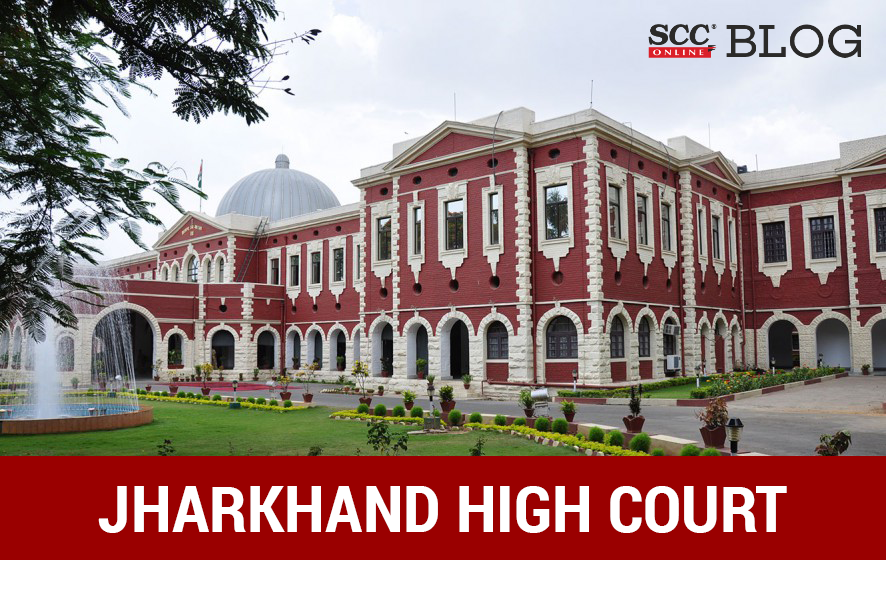Jharkhand High Court: In a petition filed under Article 226 of Constitution of India seeking direction for State to pay compensation to petitioner for his illegal detention for 4 months for offences under Sections 376(D), 302, 201 and 34 of the Penal Code, 1860 (‘IPC’) and for institution of First Information Report (‘FIR’) against the erring police officials, Sanjay Kumar Dwivedi, J. directed the State to pay compensation of Rs 5 lakhs to the petitioner which may be recovered from the salary of the erring police officers.
The instant matter relates discovery of dead body of a 25-year-old lady recognized to be a specific person, who happened to be alive and gave her statement under Section 164 of Criminal Procedure Code, 1973 (‘CrPC’). The petitioner was thereby found not guilty and thus discharged by the Court.
The petitioner was stated to be a bright student who cleared Staff Selection Commission (‘SSC’) examination and was supposed to appear for the interview, falsely implicated in the instant case which ruined his entire career by the hands of Police. On the other hand, it was stated that the Director General of Police scrutinized the case, and all three police officers were suspended, and departmental proceedings were initiated.
The Court examined whether case was made out for compensation in favour of the petitioner under Article 226 of Constitution. The Court observed that “it is crystal clear that for a crime, which has not been committed by the petitioner, who was a student, he has been made accused and was also languishing in jail for 4 months.” It further pointed at the accepted case of illegal detention as made out by the police itself since the entire prosecution against the petitioner was malicious which caused harassment and immeasurable anguish.
The Court observed that “The liberty and dignity of the petitioner, which are basic to his human rights were jeopardized, as he was taken into custody and, eventually, despite all the glory of the past, he was compelled to face cynical abhorrence and this situation invites the public law remedy for grant of compensation for violation of the fundamental right, envisaged under Article 21 of the Constitution of India for saving the life command, self-respect and dignity.”
Regarding torture, physical pain, mental torment and individual’s dignity, the Court relied on D.K. Basu v. State of W.B., (1997) 1 SCC 416; Joginder Kumar v. State of U.P., (1994) 4 SCC 260; Vishwanath Agrawal v. Sarla Vishwanath Agrawal, (2012) 7 SCC 288 and Delhi Judicial Service Assn. v. State of Gujarat, (1991) 4 SCC 406. The Court commented that the State Police’s lackadaisical attitude to arrest anyone and put him in custody made the petitioner suffer humiliation, who was having a bright career and completed SSC exam. It further said that the petitioner was kept in illegal custody for a crime which was not committed by him, who was a student at that time and illegal detention was also proved.
The Court found the instant petition maintainable under Article 226 of Constitution and observed that “Police is the main stay of the Administration of the State. It has a duty to ensure that outlaws are firmly dealt with in accordance with law. But it must confirm to the rules of law and the mandate of the Constitution of India in its functions and if it would go beyond the law to do anything in the name of Administration, it would shake the very foundation of a Constitutional democracy.”
The Court found the instant case duly made out for grant of compensation to the petitioner and directed the State to pay a sum of Rs 5 lakhs in favour of the petitioner for illegally detaining him in custody. The Court also left it open for the State to recover the said amount from the salary of erring police officers. The Court noted that the trauma and humiliation already faced could not be reversed, but the said compensation will console the petitioner to forget the past and take life onwards.
[Ajit Kumar v. State of Jharkhand, 2023 SCC OnLine Jhar 986, decided on 21-06-2023]
Judgment by: Justice Sanjay Kumar Dwivedi
Advocates who appeared in this case :
For Petitioner: Advocate Sumit Prakash, Advocate Ravi Shanker Prasad, Advocate Akash Deep;
For State: Government Advocate Manoj Kumar, Advocate Deepankar, Advocate Manoj Tandon, Advocate Neha Bhardwaj, Advocate Adamya Kerketta.









